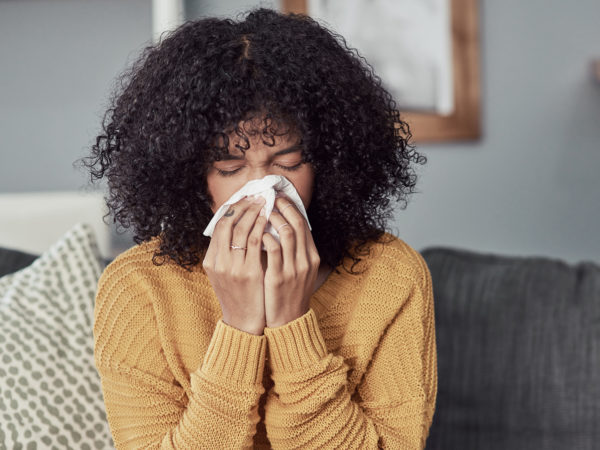6 Tips For Better Sleep During Allergy Season

If you’re one of the 40% of Americans who suffer from allergies, you know firsthand the struggle of sleeping with the symptoms. There is a high correlation between those who suffer from allergies and those who struggle to sleep. Reducing allergens around your sleep space can help you get the restful sleep your body needs.
How Allergies Impact Your Sleep
You may find that allergic symptoms are worse at night. This is because many of the common irritants that cause allergies are found in our beds and bedding. If your bedding is not cleaned well and often, these can build up over time causing more irritation as you’re trying to sleep. Itchy eyes and nose as well as sneezing and nighttime coughs can all impact the quality of sleep you get and make falling asleep more of a challenge.
Sleep Tips for Allergy Season
Minimizing the impact of allergens on your sleep starts with reducing exposure to them in your sleep space. Follow these six tips to help create a cleaner, allergen-free bed and get back to achieving the restful sleep you need.
- Shower Before Bed
Throughout the day, allergens like pollen can collect on your skin and hair. Taking a shower before bed can help to wash off any allergens on your body so you’re not breathing them in throughout the night. Additionally, taking a warm shower is a helpful way to open your airways to clear any congestion caused by allergies.
- Avoiding Allergens with a Mattress Protector
Typical allergens, including dust mites, pollen, mold, and pet dander, can build up in your mattress over time. Because mattresses are not easily washable, protecting the mattress and yourself with a mattress protector is a simple solution for allergen sufferers. Mattress protectors (and pillow protectors) can reduce the exposure.
- Use Hypoallergenic Bedding
Bedding made from all-natural materials often comes with the benefit of being naturally hypoallergenic. This means that there are fewer allergens within the fibers of the bedding. Hypoallergenic bedding is also often gentler on sensitive skin. Investing in all-natural bedding that is hypoallergenic is a great way to reduce dust mites and keep some allergens at bay.
- Wash Bedding Regularly
It’s also important for allergy sufferers to wash their bed even more regularly than recommended. If you think your bedding may be triggering your allergies at night, it is recommended to wash your sheets every 3-4 days to reduce allergen buildup. It’s also helpful to do a quick swipe of the bed and shake of the pillows throughout the week to remove any allergens that may build up between washes.
- Keep Your Bedroom Dust-Free
Even if your sheets and other bedding are clean and allergen-free, if the rest of your room isn’t, you’re still likely to feel the effects of allergens. Making sure that all flat surfaces in your room including your bed frame, nightstand, dresser, and even ceiling fan are regularly dusted and wiped down.
- Add an Air Purifier to Your Bedroom
When pollen, pet dander, mold, dust, and other allergens build up inside your home, an air purifier can help reduce them and offer relief. A HEPA (high-efficiency particulate air) filter forces air through small screens that filter out any unwanted allergens in the air and is a good investment. However, be sure to do your research to find the right air filter for your specific needs and room size before purchasing. Learn more about recommended air purifiers here: Best Way to Clear the Air?
Sources
“Allergens That Impact Sleep.” Sleep Foundation. sleepfoundation/allergies-and-sleep/allergens-that-impact-sleep
“Allergies and Sleep.” Sleep Foundation. sleepfoundation/allergies-and-sleep
“Don’t Let Allergens Ruin Your Sleep.” Rheumatology and Allergy Institute of Connecticut, LLC. allergyinstitute/dont-let-allergies-ruin-your-sleep/
“How Seasonal Allergies Affect Sleep.” AASM Sleep Education. sleepeducation/how-seasonal-allergies-affect-sleep/
Today’s Health Topics
Editor's Pick
Health Focus
Ask Dr. Weil's Q&A











